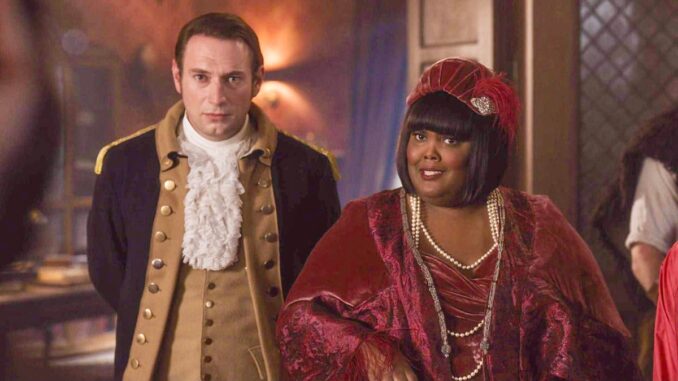
Beyond the Scowl: How Alberta of Ghosts Breaks the Angry Black Woman Blueprint
In the vast, ever-evolving landscape of American television, characters often serve as both mirrors and windows. They reflect back societal perceptions, and sometimes, if given the chance, offer a glimpse into previously unseen realities. For generations, a particularly stubborn and damaging image has shadowed Black women on screen: the "Angry Black Woman." This stereotype, a reductive caricature born of racist caricature and societal discomfort, portrays Black women as inherently aggressive, perpetually aggrieved, and devoid of the softer, more nuanced emotions afforded to their white counterparts. But in a delightful, spectral twist, CBS's hit sitcom Ghosts and its luminous star Danielle Pinnock, as the Jazz Age diva Alberta, are not just challenging this tired trope – they are gleefully, melodiously shattering it.
The "Angry Black Woman" (ABW) stereotype is more than just a character flaw; it's a weaponized perception. Historically rooted in minstrel shows and propagated through early Hollywood, it depicts Black women as loud, domineering, unsmiling, and quick to anger, often lacking in empathy or joy. This caricature serves to dismiss legitimate grievances, justify unequal treatment, and, perhaps most insidiously, deny Black women their full human complexity. It forces them into a narrow emotional box, making vulnerability appear as weakness, assertiveness as aggression, and even joy as an anomaly. Consequently, Black actresses have often found themselves relegated to roles that reinforce this very limited scope, rarely given the opportunity to explore the rich tapestry of human experience.
Enter Alberta, the vivacious, velvet-voiced ghost of a 1920s jazz singer, brought to vibrant, ethereal life by Danielle Pinnock. On the surface, one might expect a character from the roaring twenties, tragically murdered and trapped in an eternal limbo, to harbor some bitterness. And indeed, Alberta is not without her moments of exasperation, her well-placed sass, or her justified annoyance when her legacy is disrespected. But what distinguishes her from the ABW archetype is the source and breadth of her emotions, and the sheer, undeniable joy that radiates from her very being.
Alberta is, first and foremost, a performer. She lives for the spotlight, relishes attention, and her spirit is infused with the effervescent energy of the jazz age. We see her break into song with gusto, her rich, resonant voice filling the manor with bluesy tunes and Broadway-esque numbers. This joy is infectious, a constant hum beneath her sardonic wit. Her smiles are wide and genuine, her laughter booming and uninhibited. This immediate, pervasive sense of glee fundamentally dismantles the ABW’s perpetual scowl. Alberta doesn't carry a chip on her shoulder; she carries a stage presence, a desire to be seen and celebrated.
Furthermore, Alberta possesses a depth of vulnerability and aspiration rarely permitted to characters fitting the ABW mold. Her greatest desire is not to lash out, but to have her story told, her murder solved, and her fame acknowledged. This yearning for recognition, for her truth to be seen, is a poignant human desire, not an angry demand. When she feels overlooked or dismissed, her reactions are those of a person who craves validation and justice, not an individual consumed by an indiscriminate rage. Her occasional pointed remarks are often born of a witty observation or a protective instinct for her fellow ghosts, rather than an unprovoked attack. She can be vain, a little gossipy, and fiercely proud – all human traits, none of them solely rooted in anger.
Danielle Pinnock’s masterful performance is key to this subversion. Her physicality is expressive, her comedic timing impeccable, and her voice a character in itself, capable of conveying everything from theatrical delight to genuine tenderness. She imbues Alberta with an inherent warmth that makes her relatable, even when she's exasperated. Pinnock doesn’t shy away from Alberta's moments of frustration, but she grounds them in a rich emotional landscape, allowing them to be one note in a complex symphony rather than the entire melody. We see her loyalty to her ghost family, her bemusement at their quirks, and her genuine affection, particularly for Sam, the living medium who can finally hear her.
In essence, Alberta proves that Black women can be strong without being perpetually aggressive, assertive without being inherently angry, and expressive without being caricatured. She is a woman who loves, laughs, grieves, yearns, and occasionally gets annoyed – in short, a full human being. Her narrative arc, exploring her mysterious past and her desire for legacy, elevates her beyond a mere trope. Danielle Pinnock's Alberta is a refreshing, necessary counter-narrative, illustrating with vibrant strokes that Black women on screen can – and should – embody the entire spectrum of human emotion, breaking free from the reductive and harmful confines of a stereotype that has long denied their multifaceted brilliance. Her presence on Ghosts is not just good television; it's a quiet revolution, allowing joy, vulnerability, and complex humanity to finally take center stage.
